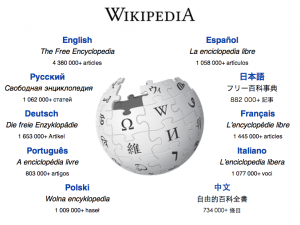The Wikimedia Foundation has accused a Texas public relations firm of writing hundreds of fake Wikipedia entries on behalf of its clients, the Verge reports. After uncovering the scam last month, Wikimedia sent a cease-and-desist letter to the PR firm on Tuesday asking the firm to stop editing Wikipedia pages until it complies with Wikipedia’s terms of service.
According to the Independent, Wikimedia’s letter to the firm reads:
We have come to the opinion that, based on the evidence we have to date, that agent(s) of your company have engaged in sockpuppetry or meatpuppetry to, among other things, make it appear as if certain articles are written by unbiased sources when in fact those articles are authored by Wiki-PR for money.”
The firm, which tellingly goes by the name “Wiki-PR,” is believed to have created over 300 fake accounts to edit Wikipedia pages. This practice, in Internet-speak, is known as “socketpuppeting” and undermines the principles of objectivity and neutrality that the online encyclopedia runs on.
Wikipedia is currently the most popular online encyclopedia. If it is uncovered that Wikipedia entries are merely publicity tools rather than sources of reliable, unbiased information, the encyclopedia will surely lose its readers. If that’s the case, a dismal picture is being painted for people everywhere: after all, who will students turn to when cramming to write 12-page research papers in one night?
Expressing her disgust toward socketpuppeting, Wikimedia Executive Director Sue Gardner said, “Our goal is to provide neutral, reliable information for our readers, and anything that threatens that is a serious problem.”
According to the Independent, Wikimedia issued a warning to Wiki-PR emphasizing the damaging and unfair nature of the PR firm’s practices:
The Wikimedia community of volunteer writers, editors, photographers, and other contributors has built Wikipedia into the world’s most popular encyclopaedia, with a reputation for transparency, objectivity and lack of bias. When outside publicity firms and their agents conceal or misrepresent their identity by creating or allowing false, unauthorized or misleading user accounts, Wikipedia’s reputation is harmed. By seeking to gain a commercial benefit from the Wikipedia brand, these publicity firms are attempting to profit from the substantial time and effort invested by the Wikipedia volunteer community.”
How do you think Wiki-PR should pay for its evil practices? Do you think Wikimedia could do a better job at preventing profiteering on its sites?




The problem here is pretty much obvious: Wikipedia has always been something that basically anyone, no matter how smart or dumb, biased or unbiased, could edit to their heart’s content. So long as it is a site modifiable by the public it can be, and will be, a cesspool of bias because it is set up in a way that allows, and even encourages, such behavior despite what its Terms of Service and Mission statements might say.
That’s why reputable schools and colleges expressly forbid the use of Wikipedia as a reference source. There’s every reason to suspect that articles about any given topic were not written by objective experts, but rather by any John or Jane Doe with interest in the subject, carrying their personal slant and bias along with their words.
First, I think most information in Wikipedia is solid. It should never be the sole source of information, especially when it is about something important (like health). Second, if a company calls itself Wiki PR, what do you expect it’s been doing? Third, is all their work inaccurate? Or is some of it good? Or is it all partially good, but needs to be edited by vigilant members?
David, unless you have examined “most information in Wikipedia” and researched its accuracy you really don’t have a leg to stand on when it comes to claiming that “most of it it solid.” The reality is that there are no controls in place assuring that the information presented is true, accurate, and reliable, nor are there any controls assuring that articles cannot be modified for commercial reasons, bias reasons, or even just pranks.
Try examining the wiki entries for politicians, celebrities, or any major news topics. Then examine those same items a week later. many topics are virtual battlegrounds of opinion.
Wikipedia can be interesting, and it can be accurate, but it cannot be *relied upon* to be accurate.
At some point in the future, the problems caused by sockpuppets could possibly be alleviated using bitcoin technology. Using a bitcoin address as a user’s ID and requiring either a sacrifice of some amount of bitcoin, or a posting of of some amount to that address for a period of time the IDs become costly. This would make the creation of use-once, throwaway IDs such as Wiki-PR used, impractical. See this post for details: http://joecascio.net/joecblog/2013/03/25/collateralized-identity-using-bitcoin-to-suppress-sockpuppets/
This was a very interesting article because I love using Wikipedia for unbiased information fast- which now seem to be compromised, at least the unbiased part, which is the most important part….